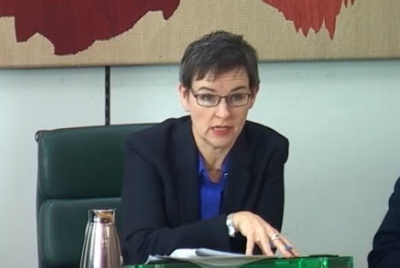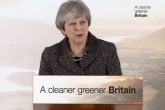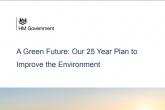Government ‘dragging its feet’ over action on plastic bottle waste, says EAC
Parliament’s Environmental Audit Committee (EAC) has criticised the government’s inadequate response to its report, ‘Plastic bottles: Turning back the plastic tide’, and lack of action of preventing plastic bottle waste.
The report contains a series of recommendations for the government to reduce plastic bottle waste – 700,000 plastic bottles are littered every day in the UK – following an EAC inquiry into plastic bottle and disposable coffee cup waste, where local authority recycling figures called for more producer responsibility for plastic packaging while the actions of the Department for Environment, Food and Rural Affairs (Defra) on the matter were accused of having “no real sense of direction” by EAC Chair Mary Creagh MP.
Despite the government’s response impressing the UK’s progress in plastic bottle recycling since 2000 and pointing to its publication of the 25 Year Environment Plan and the upcoming Resources and Waste Strategy, the Committee expressed particular concern over actions – or the perceived lack thereof – regarding the introduction of a deposit return scheme (DRS) for plastic bottles, public access to drinking water and producer responsibility obligations for plastic packaging manufacturers.

Commenting on the government’s response, Creagh said: “My committee was shocked to find that the UK unnecessarily uses over seven billion plastic water bottles every year. The government needs to do much more to combat plastic pollution. Premises serving food or drink should be legally obliged to provide free drinking water. Producers, not the taxpayer, should pay for costs of recovering hard to recycle packaging. A UK-wide deposit return scheme is a crucial next step to turn back the plastic tide."
Deposit return scheme
The EAC called on the government to introduce a DRS for plastic drinks bottles. In its response to the report, the government stated that the Voluntary and Economic Incentives Working Group was set to report to ministers ‘shortly’ to report the findings of a call for evidence on reducing plastic littering, while also indicating that a decision on a DRS could be delayed until after the consultation on a tax on single-use plastics.
Last week, Creagh wrote to the Chancellor of the Exchequer asking why this consultation has not started, three months after it was announced in the budget. The government went on to say that any DRS would have to fit into a wider set of initiatives such as reforming the packaging waste producer responsibility scheme and introducing a tax on single-use plastics.
Creagh responded: “The government is dragging its feet on introducing a deposit return scheme. Every day the government delays, another 700,000 plastic bottles end up in our streets. This delay is unacceptable, the government must get its ducks in a row. The government needs to take decisive action on this important issue instead of kicking it into the long grass.”
Commenting on government's response, the Elena Polisano, Oceans Campaigner at Greenpeace UK, said: “This sounds like the government trying to manage expectations before doing significantly less than is necessary. We hope this isn’t the case. The damage to our oceans and the widespread contamination of our environment by plastics is going to keep getting more and more obvious until we change our approach to disposable plastic. The government can help make this change smooth and efficient, or they can waste their time and ours trying to delay things until we’ve all forgotten about plastic. But we won’t forget, and we won’t forget a government u-turn on dealing with it.”
Drinking water access
When it comes to preventing the use of plastic bottles, the government acknowledges that ‘it is clear we need a culture shift’ around the UK’s use of plastic water bottles in terms of making it clear to the public what facilities are available and ensuring the public feel comfortable asking for tap water.
Defra said that, it, along with WaterUK, had committed to creating a network of water refill points across England, but the Committee stated that it received no evidence that WaterUK and water companies are doing this. Ministers have written to retailers, coffee shops and transportation hubs to encourage them to provide free drinking water, but there are still no plans to extend the requirement for licensed premises to provide drinking water to all premises that serve food or drink.
Creagh said: “Encouraging businesses to provide water refills is a positive step, but the Government should go further and make it a legal requirement for all premises that serve food or drink to provide drinking water on request. We heard no evidence from the water industry about plans to create a network of refill points. The UK has safe, clean tap water and failing to provide it leads to unnecessary use of plastic water bottles which clog up our river and seas.”
Producer responsibility
On the topic of product responsibility, the EAC called on the government to adopt a compliance fee structure that rewards design for recyclability and raises charges on packaging that is difficult to recycle.
In its response to the report, the government says that it will build on the four-point plan for tackling plastic waste released by the Environment Secretary Michael Gove before Christmas. It wants to ‘encourage producers to take more responsibility for the environmental impacts of their products’ but does not commit to any concrete policies to achieve this vision, stating instead that more detail on markets for secondary materials will be available in the Resources and Waste Strategy, while reiterating that more will be said on the use of fiscal measures to reduce the use of single-use plastics once the results of the call for evidence are published.
Creagh said: “Producers should be responsible for the packaging they produce, but shortfalls in the producer responsibility system have allowed producers to use complex, difficult to recycle plastics. The government’s Resources and Waste Strategy should adopt our recommendations to kick start more sustainable production of plastics.”
You can read the EAC’s report ‘Plastic bottles: Turning back the plastic tide’ and the government’s response on the government’s website.










